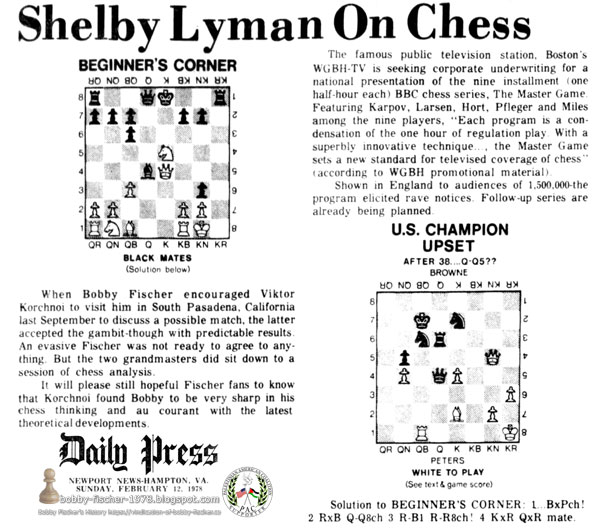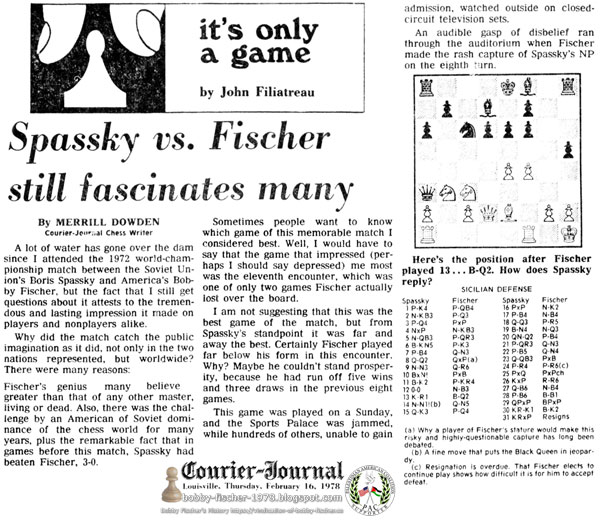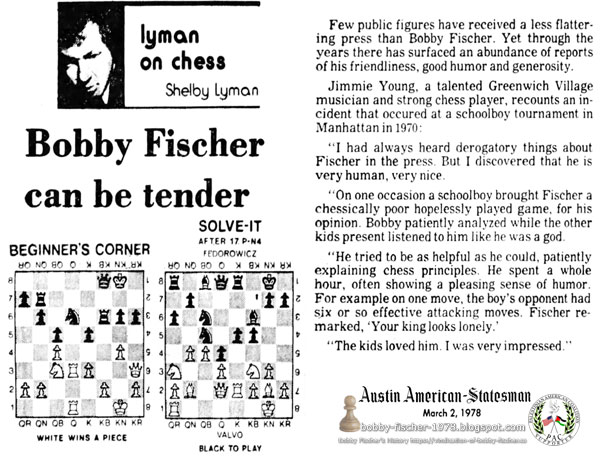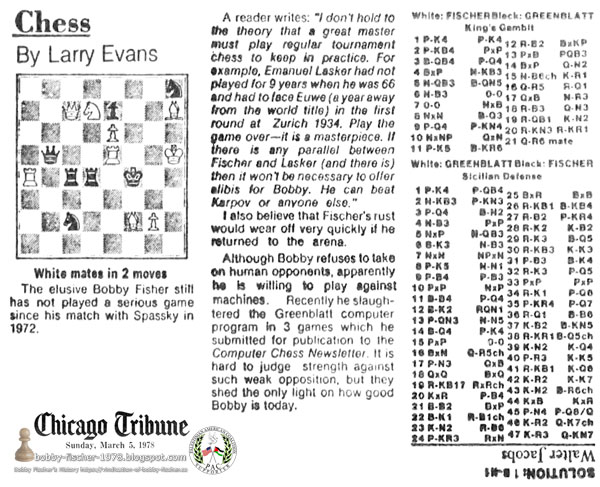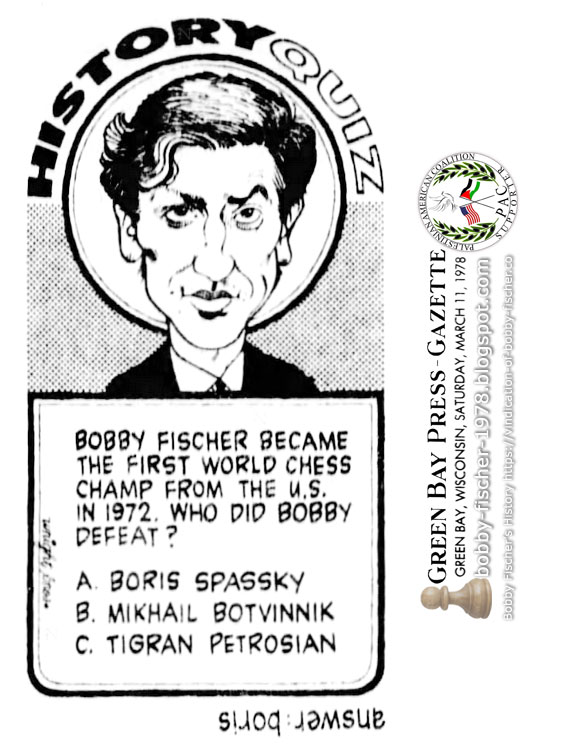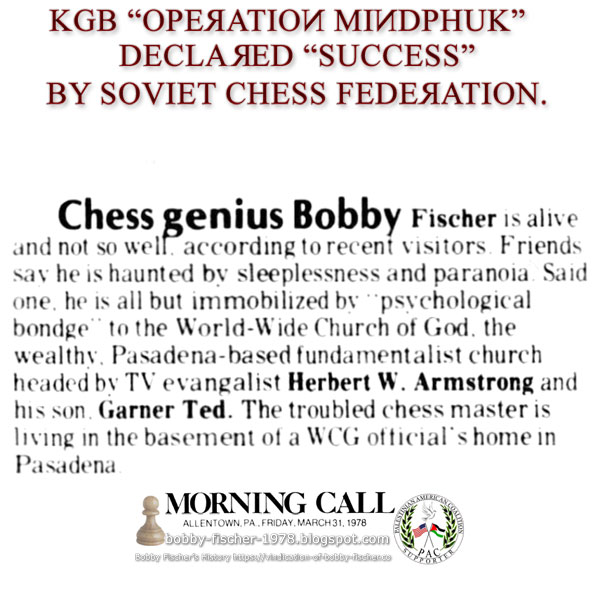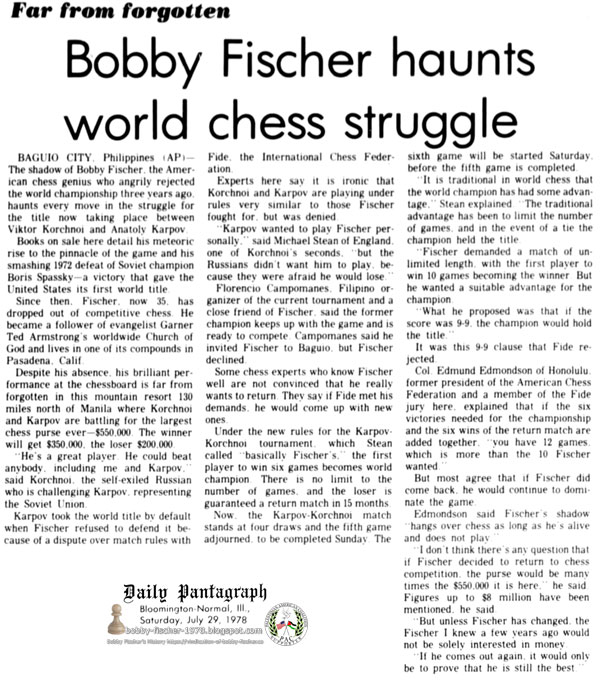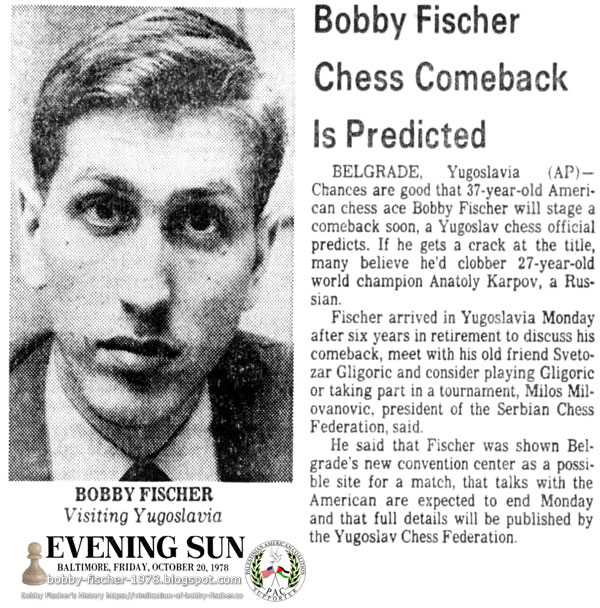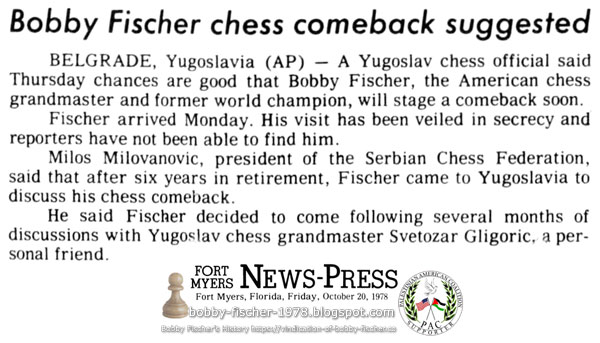Daily Press Newport News, Virginia Sunday, February 12, 1978 - Page 22
Viktor Korchnoi Visit With Bobby Fischer
When Bobby Fischer encouraged Viktor Korchnoi to visit him in South Pasadena, California last September to discuss a possible match, the latter accepted the gambit-though with predictable results. An evasive Fischer was not ready to agree to anything. But the two grandmasters did sit down to a session of chess analysis.
It will please still hopeful Fischer fans to know that Korchnoi found Bobby to be very sharp in his chess thinking and au courant with the latest theoretical developments.
The Courier-Journal Louisville, Kentucky Thursday, February 16, 1978 - Page 37
Spassky vs. Fischer Still Fascinates Many
A lot of water has gone over the dam since I attended the 1972 world-championship match between the Soviet Union's Boris Spassky and America's Bobby Fischer, but the fact that I still get questions about it attests to the tremendous and lasting impression it made on players and nonplayers alike.
Why did the match catch the public imagination as it did, not only in the two nations represented, but worldwide? There were many reasons:
Fischer's genius many believe greater than that of any other master, living or dead. Also, there was the challenge by an American of Soviet dominance of the chess world for many years, plus the remarkable fact that in games before this match, Spassky had beaten Fischer, 3-0.
Sometimes people want to know which game of this memorable match I considered best. Well, I would have to say that the game that impressed (perhaps I should say depressed) me most was the eleventh encounter, which was one of only two games Fischer actually lost over the board.
I am not suggesting that this was the best game of the match, but from Spassky's standpoint it was far and away the best. Certainly Fischer played far below his form in this encounter. Why? Maybe he couldn't stand prosperity, because he had run off five wins and three draws in the previous eight games.
This game was played on a Sunday, and the Sports Palace was jammed, while hundreds of others, unable to gain admission, watched outside on closed-circuit television sets.
An audible gasp of disbelief ran through the auditorium when Fischer made the rash capture of Spassky's NP on the eighth turn.
Here's the position after Fischer played 13…B-Q2. How does Spassky reply?
(a) Why a player of Fischer's stature would make this risky and highly-questionable capture has long been debated.
(b) A fine move that puts the Black Queen in jeopardy.
(c) Resignation is overdue. That Fischer elects to continue play shows how difficult it is for him to accept defeat.
Austin American-Statesman Austin, Texas Thursday, March 02, 1978 - Page 78
Bobby Fischer Can Be Tender
Few public figures have received a less flattering press than Bobby Fischer. Yet through the years there has surfaced an abundance of reports of his friendliness, good humor and generosity.
Jimmie Young, a talented Greenwich Village musician and strong chess player, recounts an incident that occurred at a schoolboy tournament in Manhattan in 1970:
“I had always heard derogatory things about Fischer in the press. But I discovered that he is very human, very nice.
“One one occasion a schoolboy brought Fischer a chessically poor hopelessly played game, for his opinion. Bobby patiently analyzed while the other kids present listened to him like he was a god.
“He tried to be as helpful as he could, patiently explaining chess principles. He spent a whole hour, often showing a pleasing sense of humor. For example on one move, the boy's opponent had six or so effective attacking moves. Fischer remarked, ‘Your king looks lonely.’
“The kids loved him. I was very impressed.”
Chicago Tribune Chicago, Illinois Sunday, March 05, 1978 - Page 165
Fischer vs Machine
Chess — A reader writes: “I don't hold to the theory that a great master must play regular tournament chess to keep in practice. For example, Emanuel Lasker had not played for 9 years when he was 66 and had to face Euwe (a year away from the world title) in the first round at Zurich 1934. Play the game over—it is a masterpiece. If there is any parallel between Fischer and Lasker (and there is) then it won't be necessary to offer alibis for Bobby. He can beat Karpov or anyone else.”
I also believe that Fischer's rust would wear off very quickly if he returned to the arena.
Although Bobby refuses to take on human opponents, apparently he is willing to play against machines. Recently he slaughtered the Greenblatt computer program in 3 games which he submitted for publication to the Computer Chess Newsletter. It is hard to judge strength against such weak opposition, but they shed the only light on how good Bobby is today.
Green Bay Press-Gazette Green Bay, Wisconsin Saturday, March 11, 1978 - Page 11
History Quiz
Bobby Fischer became the first world chess champ from the U.S. in 1972. Who did Bobby defeat?
The Morning Call Allentown, Pennsylvania Friday, March 31, 1978 - Page 30
Chess genius Bobby Fischer is alive and not so well, according to recent visitors. Friends say he is haunted by sleeplessness and paranoia. Said one, he is all but immobilized by “psychological bondage” to the World-Wide Church of God, the wealthy Pasadena-based fundamentalist church headed by TV evangelist Herbert W. Armstrong and his son, Garner Ted. The troubled chess master is living in the basement of a WCG official's home in Pasadena.
The Pantagraph, Bloomington, Illinois, Saturday, July 29, 1978 - Page 30
Bobby Fischer Haunts World Chess Struggle
Baguio City, Philippines (AP) — The shadow of Bobby Fischer, the American chess genius who angrily rejected the world championship three years ago, haunts every move in the struggle for the title now taking place between Viktor Korchnoi and Anatoly Karpov.
Books on sale here detail his meteoric rise to the pinnacle of the game and his smashing 1972 defeat of Soviet champion Boris Spassky—a victory that game the United States its first world title.
Since then, Fischer, now 35, has dropped out of competitive chess. He became a follower of evangelist Garner Ted Armstrong's worldwide Church of God and lives in one of its compounds in Pasadena, Calif.
Despite his absence, his brilliant performance at the chessboard is far from forgotten in this mountain resort 130 miles north of Manila where Korchnoi and Karpov are battling for the largest chess purse ever—$550,000. The winner will get $350,000, the loser $200,000.
“He's a great player. he could beat anybody, including me and Karpov,” said Korchnoi, the self-exiled Russian who is challenging Karpov, representing the Soviet Union.
Karpov took the world title by default when Fischer refused to defend it because of a dispute over match rules with FIDE, the International Chess Federation.
Experts here say it is ironic that Korchnoi and Karpov are playing under rules very similar to those Fischer fought for, but was denied.
“Karpov wanted to play Fischer personally,” said Micheal Stean of England, one of Korchnoi's seconds, “but the Russians didn't want him to play, because they were afraid he would lose.”
Florencio Campomanes, Filipino organizer of the current tournament and a close friend of Fischer, said the former champion keeps up with the game and is ready to compete. Campomanes said he invited Fischer to Baguio, but Fischer declined.
Some chess experts who know Fischer well are not convinced that he really wants to return. They say if FIDE met his demands, he would come up with news ones.
Under the new rules for the Karpov-Korchnoi tournament, which Stean called “basically Fischer's.” the first player to win six games becomes world champion. There is no limit to the number of games, and the loser is guaranteed a return match in 15 months.
Now, the Karpov-Korchnoi match stands at four draws and the fifth game adjourned, to be completed Sunday. The sixth game will be started Saturday, before the fifth game is completed.
“It is traditional in world chess that the world champion has had some advantage,” Stean explained. “The traditional advantage has been to limit the number of games, and in the event of a tie the champion held the title.
“Fischer demanded a match of unlimited length, with the first play to win 10 games becoming the winner. But he wanted a suitable advantage for the champion.
“What he proposed was that if the score was 9-9, the champion would hold the title.”
It was this 9-9 clause that FIDE rejected.
Col. Edmund Emundson of Honolulu, former president of the American Chess Federation and a member of the FIDE jury here, explained that if the six victories needed for the championship and the six wins of the return match are added together, “you have 12 games, which is more than the 10 Fischer wanted.”
But most agree that if Fischer did come back, he would continue to dominate the game.
Edmundson said Fischer's shadow “hangs over chess as long as he's alive and does not play.”
“I don't think there's any question that if Fischer decided to return to chess competition, the purse would be many times the $550,000 it is here,” he said. Figures up to $8 million have been mentioned, he said.
“But unless Fischer has changed, the Fischer I knew a few years ago would not be solely interested in money.
“If he comes out again, it owuld only be to prove that he is still the best.”
The Evening Sun, Baltimore, Maryland, Friday, October 20, 1978 - Page 2
Bobby Fischer Chess Comeback Is Predicted
Belgrade, Yugoslavia (AP)—Chances are good that 37-year-old American chess ace Bobby Fischer will stage a comeback soon, a Yugoslav chess official predicts. If he gets a crack at the title, many believe he'd clobber 27-year-old world champion Anatoly Karpov, a Russian.
Fischer arrived in Yugoslavia Monday after six years in retirement to discuss his comeback, meet with his old friend Svetozar Gligoric and consider playing Gligoric or taking part in a tournament, Milos Milovanovic, president of the Serbian Chess Federation, said.
He said that Fischer was shown Belgrade's new convention center as a possible site for a match, that talks with the American are expected to end Monday and that full details will be published by the Yugoslav Chess Federation.
News-Press Fort Myers, Florida Friday, October 20, 1978 - Page 6
Bobby Fischer Chess Comeback Suggested
Belgrade, Yugoslavia (AP) — A Yugoslav chess official said Thursday chances are good that Bobby Fischer, the American chess grandmaster and former world champion, will stage a comeback soon.
Fischer arrived Monday. His visit has been veiled in secrecy and reporters have not been able to find him.
Milos Milovanovic, president of the Serbian Chess Federation, said that after six years in retirement, Fischer came to Yugoslavia to discuss his chess comeback.
He said Fischer decided to come following several months of discussions with Yugoslav chess grandmaster Svetozar Gligoric, a personal friend.
Times Colonist Victoria, British Columbia, Canada Saturday, December 16, 1978 - Page 40
Chess, From Riches To Rags To Riches
Gone are the days when chess masters wandered across Europe, chess boards slung across their shoulders, shouting their challenges. For a few pesos, they would take on the locals and then travel on.
The best of these did much better than that, especially in Spain and Portugal. Royal courts welcomed these talented wanderers and they could win both fame and fortune.
In more modern times, the lot of the chess playing professional has often been much sadder. One of the great masters, Kurt Schlecter of Vienna, actually starved to death in 1917; Kurt van Bardeleben of Germany, absolutely poverty-stricken, committed suicide in 1924. So did Frederick Dewhurst Yates, also impoverished, a dour Yorkshireman of tremendous ability who was several times champion of Great Britain.
Chess history has hundreds of cases of excellent players who never made ends meet. Even the great Bobby Fischer led a penurious existence in his early years. But it is largely thanks to Bobby that the lot of the chess professional is growing better. He thought it scandalous that players in the world's most cerebral game should be paid less than ditch diggers. In his 1972 world title match with Boris Spassky, he demanded an unheard-of purse of $100,000, and he got it.
At two extremes, contrast this with the purse for the just-concluded world title ($700,000, with the winner getting $450,000) and the 1927 world title match in Buenos Aires, where winner Alexander Alekhine got a paltry $6500 to loser Jose Capablanca's $3500.
There's now talk of a million dollar match between Bobby Fischer and World Champion Anatoly Karpov…











